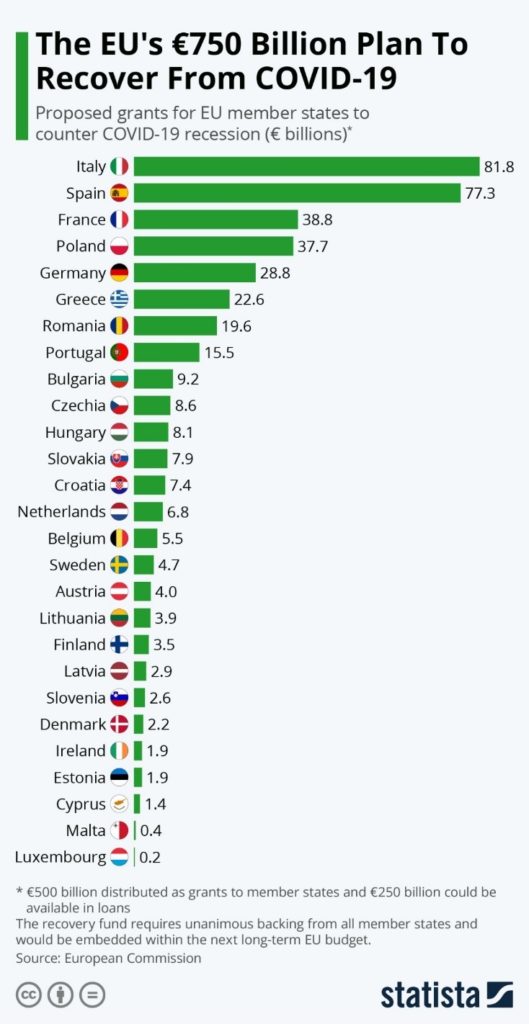Since time is running out to reach an agreement on the MFF (and the recovery package, by the way), expect some heavy diplomatic fight during the next couple of weeks.
A spoonful of sugar helps the medicine go down….
At least according to the best (fictious) nanny ever.
We’ll see in the coming weeks, whether Charles “Mary Poppins” Michel gathered enough sugar to be able to finalize the Union’s next budget and whether he can conjure similar miraculous solutions out of his suitcase. Because, let’s be honest, these days one spoonful might not be enough.
Michel reportedly told EU ambassadors that he is not accepting no as an answer.
He also said that he intends to preserve the “size and ambition” of the recovery fund, and also the balance between grants and loans. So Michel plans to satisfy the Frugal Four by “slightly” reducing the size of the MFF, but to satisfy the East, he doesn’t intent to touch cohesion or farming. Let’s see what Greens in the Parliament will say about this, since these two promises together mean that something else must be diminished, e.g. one of the new policies.
Today or never, that’s my motto
Another hot potato will be the issue of the rebates. It seems that they are here to stay, or as Michel informed the EU ambassadors, they “are part of the solution”. And that’s bad. Even if I understand that that is another way to keep the Frugal four at the negotiation table, these are more like relics from the past and should be phased out, parallel to Brexit. Or, at least, allocations should be reflecting the different economic and social development levels within the EU.
Strings attached (this is not a quote, this time)
Two kinds of strings are to stir up sentiments. One is the proposed conditionality on how countries can spend EU money or what the level of collective oversight should be over the reform plans. The other one is the rule of law issue, again.
I’ve written extensively about the latter, so I’ve no intention to repeat myself here: as long as there is no clear-cut regulation based on an accepted definition of the phrase rule of law conditionality shouldn’t be introduced.
The former proposal isn’t too popular, either. Even if Angela Merkel has urged her fellow EU leaders to make compromises to secure a swift deal, countries clash over the conditions attached to receiving the aid.
The Commission tries to find a middle ground, with Ursula von der Leyen saying that “financial support is linked to nations’ willingness to carry out competitiveness-enhancing reforms” and also to Brussels’ regular assessments of national economies’ structural weaknesses, as these should guide the national reform programs.
On the other hand, the Frugal Four want the Council to have a strong role in approving the national plans, in order to ensure that countries are implementing reforms designed to make the jobs market more flexible and address lossmaking state pension systems.
Greece has already signaled that it’s not happy with the proposed conditionality, and the Italians weren’t much happier, either.
There’s a different point of view awaiting you if you just look up
Going back to point Nr. 1., it’s not just the Greens, I suppose, who would oppose cuts to MFF.
Especially, since the recovery package tilts towards the South: Italy and Spain gain much more from the recovery fund than all Central and Eastern European states combined.

This uneven structure was justified by the different recovery prognoses these states face. For details, check the Commission’s latest economic prognosis, I only quote a few highlights, e.g. “Among the largest euro area countries, above-average GDP contractions were reported in France, Italy and Spain (at around -5 percent)” or “construction picking-up strongly in Germany and the Netherlands thanks to a good start of the year, while falling significantly in France, Spain and Italy”. Or this one: “Over the forecast horizon the recovery is expected to be incomplete in a large majority of euro area countries, as the level of GDP at the end of the last quarter of 2021 is forecast to be inferior to what it was in the last quarter of 2019. Among the largest euro area economies, this difference is forecast at about -4 ¾% in Italy, -4% in Spain and -3 ¼% in France.”
But looking from another angle (e.g. from the East) the story looks differently.
The crisis once more drew attention to the structural problems in the South. Differing recovery prognoses also reflect the different timing at which containment and social distancing measures were introduced and lifted; the structure of the economy, particularly the importance of tourism and leisure activities; etc.
Countries there had already high levels of unemployment that grew further due to the lockdown. Many countries in the East chose a different path, and instead of allowing thousands to slip into unemployment, government-financed part-time work schemes or other devices were introduced.
These extended short-time work schemes – partly encouraged, supported and financed by SURE – have played an important role in keeping employees attached to their jobs even in periods without any or with substantially reduced economic activity. The number of persons reported as short-time workers have reached unprecedented levels (e.g. in Germany). However, these numbers only indicate how many companies consider the schemes as a precaution and not the actual number of persons receiving short-time allowance, which will remain unknown for some time. In addition, working time accounts and a reduction of overtime hours helped to smooth out the impact of the shock. However, these schemes are not identical in all Member States, which contributes to marked differences.
Thus, all these measures proved effective to a certain extent and also provided some sort of “safety” (at least mentally) for the population, yet were just as costly as raised unemployment supports were.
Basically, these states get more aid (let it be grants or loans) because they couldn’t restructure/balance their economies, while the others are “punished” for being more effective. I know, this is a bit of exaggeration, but I hope you see my point.
Especially since there are some who claim that (with the help of the EU) Italy might be able to shake off the crisis without actually having to confront its own economic failings (Read the great article of Alessandra Migliaccio and Catherine Bosley on Bloomberg for details). Becoming the biggest beneficiary of the recovery package might prove counterproductive, even more so, if the strings attached won’t be too strict. (Something Rome argues for.)
All in all, creating an East-South divide is not in the interest of any of the two masterminds behind the idea (Merkel and Macron): it can weaken the internal cohesion of the EU, just like a North-South one. That’s definitely not something Ms. Merkel wants to be part of her legacy.
To avoid this, it might be a good idea to choose a different or supplementary path, either within the recovery pack or by further restructuring the MFF. Just to the extent that secures that Eastern countries are not alienated from the EU.
Everything is possible, even the impossible
Another quote from the brilliant and witty Mary to close this article.
Let’s hope that Charles Michel manages to do exactly this: prevent a new frontline emerging between East and South (and the rest of Europe) and get a modern, fit-for-the-new-challenges budget for the EU.
Otherwise, it will be just as unlikely to keep the European dream alive as it is to pronounce “supercalifragilisticexpialidocious” correctly.

Valuable info. Fortunate me I discovered your website accidentally,
and I’m shocked why this coincidence didn’t took place earlier!
I bookmarked it.